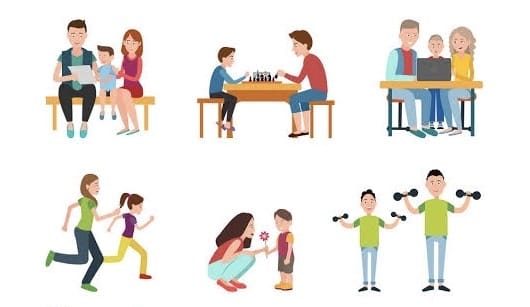Parenting during COVID-19


How to build social skills and nurture relationship-building abilities with the children.
- Your child learns a lot from you, so set an example
Think about how you interact with your family and friends, and how you make and keep friends. Is your behavior setting a good example for your child? Are there certain relationships or areas that you can work on? Evaluating your own relationship skills is a crucial step in teaching your child about social management, and by being reflective, responsive and supportive, you are helping to nurture your child’s sense of social and emotional well-being.
- Cooking with your child is therapeutic
Ask your child to help make their favorite dish by following your directions, one at a time. Make sure to say “please” and “thank you” and acknowledge all of their efforts. This will not only help them learn about the art of listening, but it also teaches them about the importance of being polite to others, especially while working on group projects.
- Have a good conversation and don’t forget to appreciate
Don’t be satisfied with one-word answers. Often, parents have a lot on their plate and are happy to keep discussions brief, but children need practice in expressing themselves clearly and completely. Try to appreciate when your child says something that is thoughtful or when your child uses their language skills appropriately. For example, when your child says something kind about others, like, “My friend was nice to me today because he shared his snacks with me,” or if your child poses a good question during your conversation, “Can I take some snacks to share?” When your child asks something that is not related to what you are talking about or not clearly expressed, help them stay within the conversation.
- Help in finding solutions to problems and give your assurance
A helpful approach is to ask questions about what your child thinks they should do in any situation, and what the consequences of their particular solution will be. For example, if they are having a hard time with a classmate or anyone, you can say, “If your friend doesn’t want to play with you, you might want to ask them if you did anything to hurt their feelings. Do you think you should say sorry? If you say sorry, she might feel better. If your child did something to you, maybe you can ask them why he did that.” You may not be around to solve any difficulties that occur, and it is better to start helping your child build this essential skill when they are young and problems are less serious.
- Talk to your child about ‘Friendships’
Ask your child who their friends are, and then ask them about the qualities that your child looks for in a friend and how your child likes their friends to treat them. For example, ask her, “Why do you like to play with Ananya after school? What makes her a good friend?” Make sure to ask them about qualities that your child doesn’t like, and what makes them a good friend to others. For example, “Has Shannon ever said anything that made you feel sad?”

Leave a Reply
You must be logged in to post a comment.